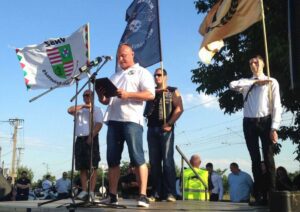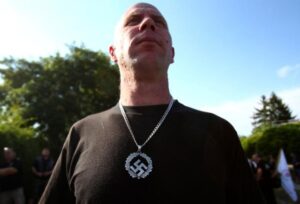Horst Mahler will be known to most long-time anti-fascists and readers of Searchlight as a man who has spent a lifetime as an active terrorist and the guru for thousands of hardline National Socialists and those who frequent up-and-coming extreme-right groups around the world.
His father, a man of the cloth, was an underground opponent of the government in the German Democratic Republic, which was controlled by the Soviet Union after the Second World War. For some unknown reason the East German regime relaxed its strict rules prohibiting its citizens from leaving the country and allowed the family to move to West Germany. Suddenly Mahler became an activist inside the left-controlled student movement. His writings were, and in some cases still are, attracting a readership in some fringe anarchist groups.
He ended up as an active member of the terrorist Baader Meinhof group which bombed and murdered across Germany. The German government and media proclaimed them as coming from the Left; others were suspicious that the group was a creation of Gladio, the Nato and CIA backed organisation that was using far-right groups as “stay-behinds” should Russian tanks roll into the West. One of its targets was to destroy the legitimate left and the growing peace and anti-war movement. The Baader Meinhof group targeted a wide range of institutions and individuals. Many bombings of US military bases took place, businessmen and politicians were targeted, but they also targeted Jewish institutions and in one raid on a care home for elderly Jews a caretaker was shot dead, in a cold-blooded murder for which nobody was ever convicted. When the group collapsed, its two main leaders died in prison in mysterious circumstances. Some members fled aboard, other died and some received prison sentences. Among these was Mahler.
When Mahler left his prison cell he joined the German post-war Nazi scene and ended up as the lawyer defending the National Democratic Party (NPD), the largest extreme-right party, in the constitutional court. It was Mahler’s skill as a lawyer that saved the NPD from being banned. Sometimes his relationship with the NPD leadership was fractious. But his esteem grew in the international hardline Nazi scene.
In recent years he had played a leading role internationally with Holocaust deniers not only in Europe but worldwide. He drew a number of older and some younger people who idolised him.
These included the Jewish traitor and jazz musician Gilad Atzmon, who started to campaign for Mahler’s release from prison, where his activities had led him again. Among those who were prepared to take a stand on Mahler’s behalf were Gudrun Himmler, the daughter of the SS leader Heinrich Himmler, and a group of other ageing senior SS women, who were involved in distributing illegal Nazi propaganda and training young Nazis. They intervened by raising funds to support them in court and as a result some were sent to prison themselves.
Mahler’s supporters wanted to give an international dimension to their campaign for his release by calling on other Nazis to protest to and picket German embassies abroad and to demonstrate outside courts and the prison when Mahler was appearing.
Atzmon has built a very close relationship with Mahler. They have exchanged communications, sometimes illegally, with Mahler writing many words of praise about Atzmon and vice versa. Atzmon, who is one of the top jazz musicians in the world, makes a very good living appearing in the UK and other European countries but some time ago became very nervous that the German authorities were intercepting some of the illicit communications between them and decided to stay out of Germany because, if action had been taken against him under the Schengen Treaty, he would have banned from entering all its 26 signatories. Clearly, when push came to shove, Atzmon put earning a living before his support for a national socialist icon.
Mahler became seriously ill and part of one of his legs had to be amputated. He was then returned to carry on serving his sentence in a prison hospital. At this point the authorities served fresh charges against him over his current illegal activities. His supporters decided to take the step of rescuing him from prison.
On 20 April 2017, the anniversary of Hitler’s birth, he was sprung from prison and driven across the German-Hungarian border to the town of Sopron which has a large German population. Many friends and admirers of Mahler were waiting to greet him. The group that assisted in his escape was an upmarket Holocaust denying group called Ende der Lüge, the End of Lies. Its leaders are Henry Hafenmayer, Christian Zielonka and Robert Steinert. The group appears to have its base in northern Germany.
Mahler brought into play his legal knowledge with an appeal to the right-wing Hungarian government for political asylum, but his timing was out of sync as the Hungarian government had just begun expelling foreign Nazis who had set up shop and homes in the country. Among the first to be expelled were Nick Griffin, the former BNP leader and MEP, and his Ulster loyalist extremist James Dowson.
Mahler’s application was immediately rejected and he was put on his way back to a prison cell in Germany.
We wonder why the Hungarians are continuing to allow Arktos Media, one of the largest peddlers of all sorts of Nazi and hate material, in the world to stay.


Out of the blue a Hungarian openly Nazi party, by the name of Force and Determination, has announced its formation and hopes to do well in the 2018 elections. From a Nazi standpoint it is understandable why its leaders, Balázs László and Zsolt Tyirityán, have created this group, because the existing main extreme-right party Jobbik has begun to weaken its extreme line in the hope of closing the gap between it and Fidesz, the ruling party. The new group thinks the field is being left open for it to continue the wave of murderous attacks on Roma communities and the few refugees who have made it through the heavily militarised Hungarian border.
